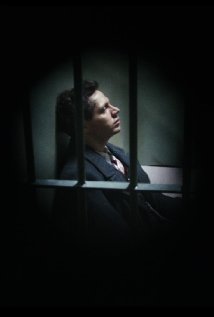
ELSER
Germany, 2015, 110 minutes, Colour.
Christian Friedel, Katharina Schuttler, Johan Von Bulow, Burghardt Klaussner.
Directed by Oliver Hirschbirgel.
Oliver Hirschbirgel’s, Downfall, showing the last days of Hitler, was a great international success though causing some controversy in Germany with its picture of Hitler, indicating some more humane aspects of his behaviour. Hirschbirgel had already made quite an impression with his feature debut, The Experiment.
After several years making films abroad, The Invasion and the portrait of Princess Diana, Diana, both of which were not well received, he returned to Germany to make this film about the era of National Socialism.
The subject is Georg Elser, a man in his 30s, seemingly quiet, interested in folk music, a touch of the womaniser and his work in the town in the Jura Mountains. The film opens with his setting up a bomb in a hall in Munich, timed to assassinate Hitler as he made an address. It is 1938.
However, the attempt to kill Hitler was a failure, with Hitler leaving the room 13 minutes earlier than anticipated. Elser is caught, interrogated with torture, threatened by bringing his lover into the interrogation, but his never giving up any information. Hitler thought that it was a conspiracy and would not believe that it was the work of one man – with Else spending some time explaining the bomb and his skills to the interrogators.
The film offers flashbacks to his character, his mother, life in the town, his music, the clashes with National Socialists, the birth of the child and its death. Elser was condemned to Dachau and was executed just before the liberation of the camp.
Christian Friedel gives a convincing performance and the film makes the point that while attention is given to Von Stauffenberg and his attempt to kill Hitler, and people like Dietrich Bonhoeffer are held in high regard, with films made about Sophie Scholl and others who resisted, Elser was often considered something of an eccentric loner. This film rehabilitates his memory.
1. German cinema and the treatment of Hitler and National Socialism and the consequences?
2. The title, the focus on the character, his attempt to kill Hitler, the 13 minutes and the failure?
3. The period, the 1930s, the town and the workers, homes, inns, National Socialism? The detail of the town life? Munich? The police, the Gestapo, interrogations, torture? Scenes at Dachau? The musical score?
4. The opening, the details of Elser’s placing the bomb? The Assembly, Hitler‘s speech, the audience, acclaim? The streets, Elser being caught, the police, the blood on his hands, his knees, the documents? His waiting for the explosion, its happening but his not knowing the result? Hitler leaving 13 minutes earlier?
5. The interrogations and the torture, graphic, crude, the beatings, the burning, Elser being sick? The cell, small, the crucifix, his focus, praying, the Lord’s prayer? His refusal to give any information? His strength? The authorities bringing in Elsa? The authorities not believing him, his detailed explanations, drawing? The police chief believing him? The irony of the photo and its being posed for propaganda purposes and Elser agreeing?
6. Elser’s story, his past, family, at home, joining the folklore group, his love of music, playing at the dances? His work as a carpenter, the detail? The communists in the town? The National Socialists? The rowdy young men, the violence in the streets, bashings? The bars? Card games? Elser and his attraction to women, flirtatious? Seeing Elsa, talking with his mother, his decision to board with Elsa, Erich and his brutality, bashing his wife? Her pregnancy? Elser and the birth of the child, his joy? The baby dying? His decision to leave, taking the photo of Elsa, the secretary quietly giving it to him?
7. Nebe, hard, the interrogation, his observations, believing Elser, signing for the chemicals for torture? The irony of his being hanged? His support of the plot against Hitler 1944?
8. Muller, cruel? His assistants and their torturing?
9. Elser and his explanation to the authorities, Hitler wanting to know more, believing that it was a conspiracy?
10. Elser, his speech about the future, National Socialism, the effect on people, the Jews, poverty, the workers, wages and their diminishing, the consequences of war, France and England, the annexation of Poland, the bombings of Germany?
11. His imprisonment in Dachau, the charge, signing the document, his execution?
12. His reputation, some considering him as not heroic? The rehabilitation of his reputation?